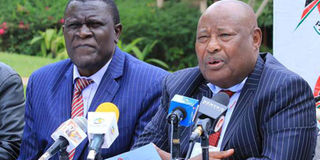Matiba death, national unity and the paradox of regional balance

National Cohesion and Integration Commission Chairman Francis ole Kaparo (centre), and his commissioners at a past press conference on May 17, 2017 at Safari Park Hotel, Nairobi. PHOTO | FILE | NATION MEDIA GROUP
What you need to know:
- One of those who gave the fieriest defence of the detention holds a key post in one of the most crucial commissions as far as national unity is concerned.
- The post-Matiba period and its attendant testimonials have brought to the fore the importance of service to the nation.
- Every Kenyan must be granted a fair chance at opportunities.
As Kenneth Stanley Njindo Matiba’s ashes settle whence they came from, Kenya is the poorer; the role he played in making the country a better place cannot be gainsaid.
In his 85 years, Matiba lived well — for the living and the yet-to-be-born — especially in the first five decades. But it is on the days following his death that the country should focus to harvest the ‘Second Liberation’ icon’s best gift to humanity.
Unlike South Africa’s Julius Malema, who exhorted Winnie Madikizela-Mandela to give her followers a “signal” on how to move forward, Matiba’s sign is clear: Plan your life as one who will live forever but live as if you will die the following day.
A good illustration of that is a story in the April 22 Nation, which had excerpts from a Hansard report on how some MPs discussed the 1990 detention of Matiba and his fellow multi-party democracy advocate Charles Rubia, 28 years before he passed on.
DEBATE
Although we did not get to read the entire debate, it is not difficult to imagine how those MPs felt on being publicly reminded of what they said about men who were suffering for fighting for the greater good of the nation that many of them were to personally benefit from.
And although some of those who were part of the system that persecuted Matiba preceded him in death, some went on to hold much higher positions in government. In fact, one of those who gave the fieriest defence of the detention holds a key post in one of the most crucial commissions as far as national unity is concerned.
The post-Matiba period and its attendant testimonials have brought to the fore the importance of service to the nation. Though witness accounts have sought to present him as near-perfect — as they always do after death — the truth is, Matiba was as fallible as any person but one who knew when mistakes had been made and went to great lengths to correct them. He was willing to pay with his health and wealth to have oppressive laws removed.
As a Cabinet minister, he could have continued enjoying the trappings of power but didn’t.
SUPERFICIAL DIFFERENCES
More importantly, in Matiba’s death, we saw how fast and easily Kenyans can put aside their superficial differences and come together for a common purpose. Politicians, captains of industry and everybody else was mourning him. One’s last name, parentage or region of birth or abode mattered not.
Which brings me to the popular concept of regional balance in recruitment and appointments to public service.
Granted, every Kenyan has a right to employment. Every Kenyan must be facilitated to fend for themselves and their families. Every Kenyan must be granted a fair chance at opportunities. But when it comes to leadership, it serves the country better if the best person for the job is given that opportunity.
NATIONAL ASSEMBLY
That brings to mind a debate I witnessed in the National Assembly from the press gallery a few years back. MPs were discussing the shortlisted for the chairmanship of a commission. All the six, who had been ranked according to their score in the interviews, were women.
The debate was acrimonious and the language used by specific male politicians to describe some of the candidates wanting. Eventually, they settled on the fourth-placed candidate. The highest ranking, a professor to boot, was rejected by virtue of being of the same ethnicity with some of the commissioners. Ditto the second- and third-ranked. But it later emerged that either misinformation or another consideration was used to deny the top three the job.
As the nation puts the life of KSN Matiba into its collective memory, the National Cohesion and Integration Commission, which is still struggling to make an impact, should take the lead in striking the balance between regional balance and competence in public service posts.
Ms Rugene is a consultant editor. [email protected] Twitter: @nrugene





